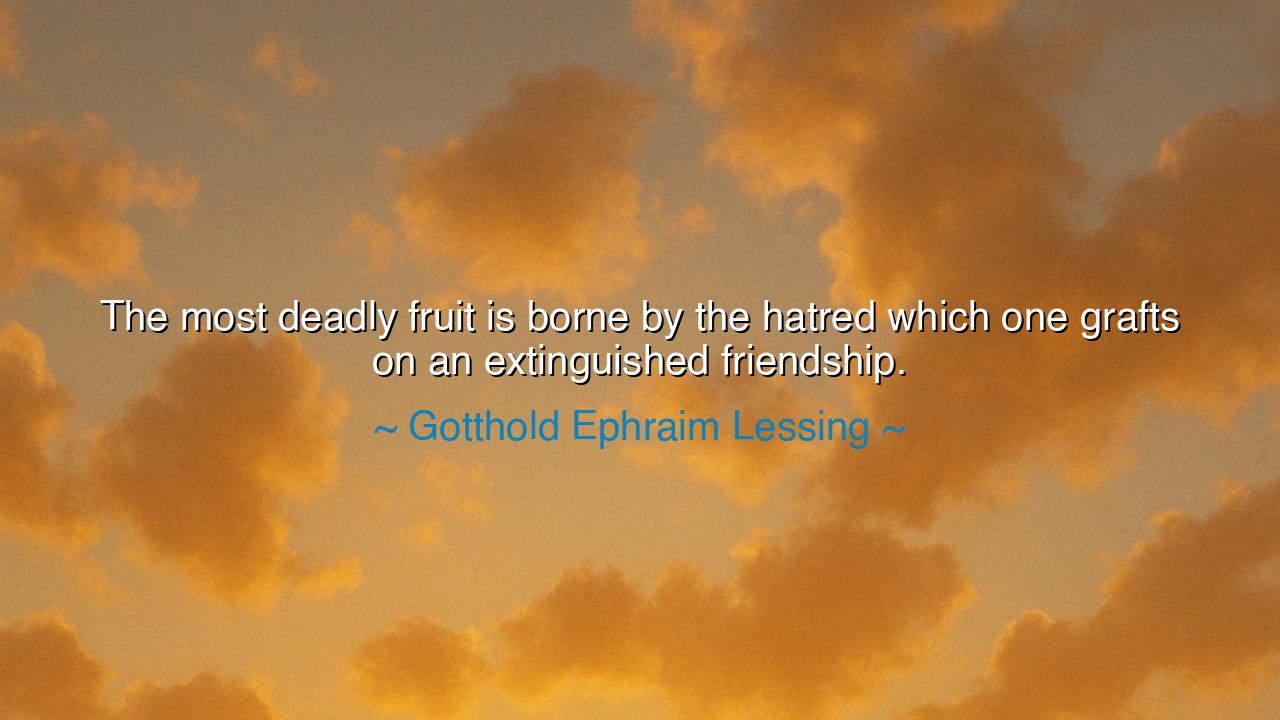
The most deadly fruit is borne by the hatred which one grafts on
The most deadly fruit is borne by the hatred which one grafts on an extinguished friendship.






Hearken, O seekers of wisdom, to the grave counsel of Gotthold Ephraim Lessing, whose words illuminate the perilous shadow that may linger where friendship once dwelt: “The most deadly fruit is borne by the hatred which one grafts on an extinguished friendship.” In these words lies a timeless warning: when the warmth of friendship dies and is replaced by rancor or vengeance, the heart produces a poison that spreads beyond the self, corroding character, clouding judgment, and bringing ruin to all whom it touches. Hatred, nurtured where love once flourished, is the most insidious of all human afflictions.
The origin of this insight rests in Lessing’s keen observation of human nature, in the theater of life and society. He understood that friendship is a sacred covenant, a bond of trust, loyalty, and mutual regard, and that to betray or neglect it is grievous. Yet even more grievous is the transformation of its loss into hatred. Where anger replaces remembrance, bitterness feeds upon memory, and the soul cultivates a garden of thorns. Such hatred, born of extinguished companionship, is more dangerous than any fleeting quarrel, for it carries the weight of intimacy turned malignant.
Consider the tragic tale of Alexander the Great and his companion Hephaestion, whose bond of friendship was profound. Had Alexander, in moments of anger or misjudgment, allowed resentment to take root where their friendship once flourished, the world might have lost the virtues their unity inspired. The power of companionship, and its potential for devastation when corrupted, is echoed in Lessing’s warning: the bitterness of lost friendship can yield a poison far more deadly than enmity that arises between strangers.
The essence of this teaching lies in the recognition that human hearts are fragile vessels. When love, trust, or friendship is lost, grief and disappointment may give birth to hatred. This hatred is not merely an emotional tempest; it is a force that warps perception, hardens the soul, and often spreads outward to infect others. Lessing likens this to the bearing of deadly fruit—an image of abundance, yet of ruin, for what grows from bitterness is never nourishing, but destructive.
History offers stark testimony. The prolonged enmity between Brutus and Mark Antony after the death of Julius Caesar demonstrates the corrosive power of hatred born of fractured bonds. Where once political alliances and mutual respect existed, betrayal and the extinguishing of trust gave rise to vengeance, political strife, and bloodshed. The hatred grafted upon their fractured relationship bore deadly fruit not only for themselves but for the Roman Republic, illustrating Lessing’s enduring wisdom.
The moral of this reflection is clear: cherish the bonds of friendship while they endure, and mourn their loss without cultivating hatred in their place. The heart that allows resentment to fester where trust once resided produces harm both to itself and to the wider world. Recognize that extinguished friendships are part of life’s path, yet hatred need not follow; compassion, forgiveness, and reflection offer the way to transform loss into understanding rather than poison.
Practical guidance flows naturally from this teaching: when a friendship ends, honor its memory without succumbing to bitterness. Engage in reflection, seek closure, and cultivate empathy for both yourself and the other. Guard against the temptation to nurture hatred or dwell on betrayal, for such seeds bear fruit that is deadly and lasting. In this, one preserves the integrity of the soul and prevents the corruption of spirit that follows rancor.
Thus, remember the warning of Gotthold Ephraim Lessing: hatred born of extinguished friendship is the most deadly of fruits, capable of corroding character, clouding judgment, and spreading suffering. Let the heart mourn, learn, and grow, but never cultivate rancor where loyalty once bloomed. In this way, one honors the sacredness of companionship, preserves moral integrity, and ensures that even the pain of loss may give rise to wisdom, not poison.
If you wish, I can also craft a short, rhythmic version for motivational or audio narration, emphasizing the emotional arc from lost friendship to the dangers of hatred. Do you want me to do that?






AAdministratorAdministrator
Welcome, honored guests. Please leave a comment, we will respond soon